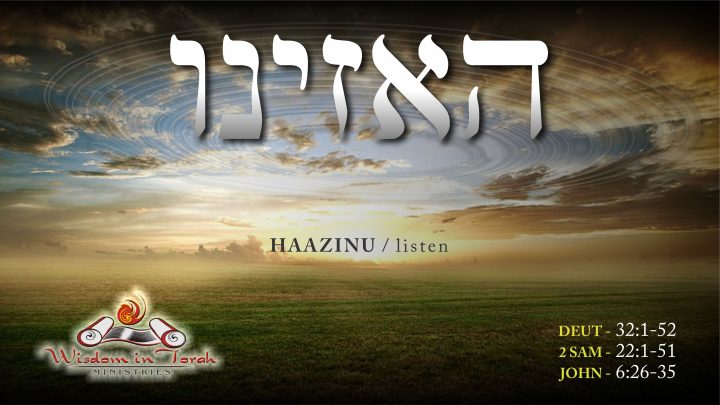
Don't Forget to Share!
This Parashah covers the 2nd Song of Mosheh. Chapter 32 of Deuteronomy is called in the Ancient Near Eastern Context, a Covenant lawsuit and it legal ramifications to the breaking of the covenant. Also, it serves as a witness against the children of Israel. We should make an effort to learn this song and understand our duty to the covenant with our Great Suzerain YHVH.
We have seen how the world is taking a deep breath trying to figure out what to do in Syria in recent years and what kind of action to take for their chemical weapons use. One of the main arguments is about what legal right does the U.S. has to declare a limited war on Syria. The language used in this political issue is that of a covenant lawsuit against Syria for transgressing on a Covenant they signed 100 years ago. Syria agreed that they would not use chemical weapons and they broke that Covenant. So, now the world can take legal case to stop the killings in Syria. Haazinu is written as a song but with the legal characteristics of a Covenant Lawsuit. We will also connect some of the Metaphors used in the Ancient Near East with connection to the Torah and the message that YHVH is trying to convey to Israel as their God and Maker.
This page includes Torah Portions from multiple years covered by Wisdom in Torah. Each year we covered the Torah from a different perspective so you can explore each Parashah from a different perspective and focus.
- 2010 Portions: Focus on Messianic connections in the Parashah
- ANET Portions: Focus on the ancient Near Eastern cultural context of the Parashah
- Mitzvot Portions: Focus on explaining and exploring the commandments found in the Parashah (in progress)
- 2015 Portions: Revisiting the Parashah looking at the ancient cultural context more in depth with additional areas that have been researched
- Brit Portions: Focus on connecting the Brit Hadashah (New Testament) to the Parashah
Oops, this is members-only content
This page requires at least a basic level membership to access the teaching.
Audio
Oops, this is members-only content
Resources
The following is a list of recommended resources for this teaching:
- Power Point for ANET portion: The Covenant Lawsuit in Deu 32
Categories
37 thoughts on “Torah Portion Ha’azinu Complete”
Leave a Comment
You must be logged in to post a comment.

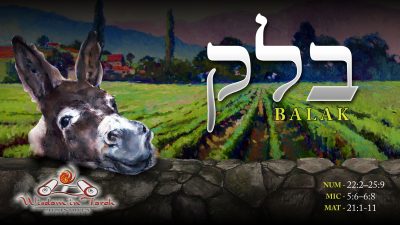
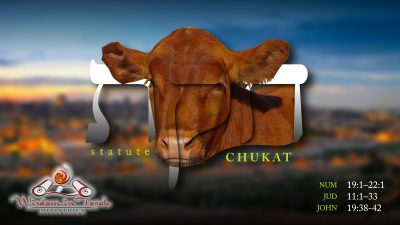
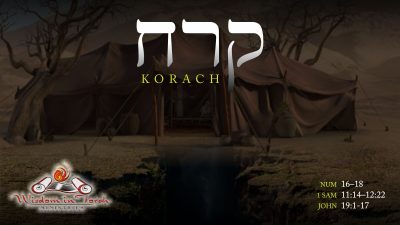
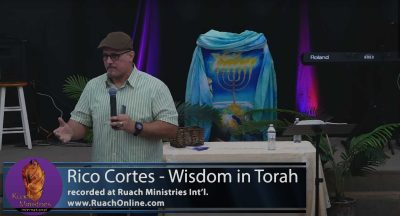
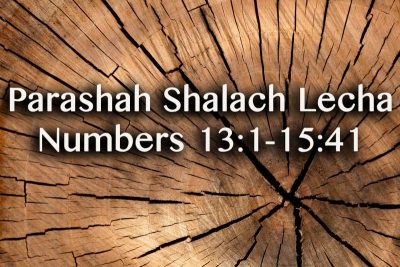
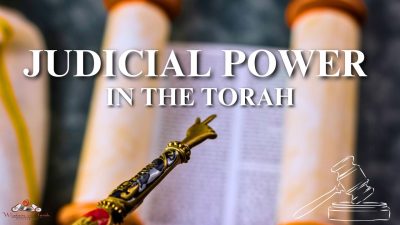
Shalom Rico, I noticed at the begining of the video you said last years date, 2010-2011. Do you have one for this year yet?Also, what are your veiws on the moon? Are there any scriptures backing up the veiwing of the sliver, or the new phase as being the new moon? How did David know ” tomorrow is Rosh-Hodesh” in 1 Samuel 20:5 and what festival were they celebrating then? Blessings! Thanks! Enjoy your Succoth!
Jon
Shalom
I am starting the new torah portions for next year and I am recording the first few weeks already. Is in the context of the ancient near east.
In regards to the moon, I am have being studying it and I am still taking my time before I can render the proper understanding on the subject matter. In other words I do not know yet.
Thank you for reminding us about the deeds that we have as proof that Israel belongs to YHWH and His children. But yet, the authorities do not acknowledge these deeds from Adonai. How sad. Just the same, the USA claims to be founded in Christ Messiah, yet the government denies it and has removed God from public schools and government buildings. Lord have mercy on us! I’ve been thinking about this all week, and compare it to the Israelites and how God wanted His children to be in covenant with Him, not tolerating idolatry nor adultery, and yet, here we are, those in the USA who claim to have established this country in His Name, but who tolerate false gods and other religions in the name of tolerance. How very wrong this is! Is it any wonder that we’re in such a mess? Repent!
Scott,
I found an interesting commentary on it from Rabbi Samson Raphael Hirsch. This is from his Torah Commentary published by Feldheim (Pages 760-762).
We have already stated in our Commentary on Bereshis (1:24-26) that not every high place is called a “במה”; rather, a במה is a high place that serves as a base for the elevation of what is upon it. במותי ארץ, then are not synonymous with הרי ארץ, גבעות ארץ, but are lofty heights, the ascent to which fulfills an aspiration. Hence, במות is the designation for any high position that one strives for and attains. יעמידני ועל במתי (Tehillim 18:34), ועל במותי ידרכני (Chavakkuk 3:19), על במותימו תדרך (below, 33:29).
The plural form in the construct state, במתי, points to a dual plural form [i.e., two, but no more than two], like ירכתי from ירכתים. The simple plural of במה is במות – also in the construct state; thus במות ארנן (Bemidbar 21:28), במות בעל (ibid. 22:41). In ירכתים the dual plural denotes the space at the back, which joins the two sides of the length. Accordingly, במותי would mean double heights, only that the written form of במותי here [with the ו] includes also the sign of the simple plural [see below]. The dual plural form, ” במתי” occurs only in connection with ascending or treading upon heights, and always in a symbolic sense; thus here and thus והרכבתיך על-במותי ארץ (Yeshayahu 58:14), ודרך על-במתי ארץ (Amos 4:13), על-במותי ארץ (Michah 1:3), ודורך על-במתיים (Iyov 9:8), אעלה על-במתי עב (Yeshayahu 14:14). All these verses describe a position that grants eminence, power, mastery. Accordingly, it appears that the dual plural form expresses the two aspects of this position. במתי ארץ, במתי ים, and במתי עב, in connection with God, express the aspect of God’s mastery: Since God is high and exalted over the earth, over the sea, and over heaven, He is Master over both the world of nature and the world of man. במתי ארץ in connection with man expresses the two aspects of the blessing given to man: Once he reaches the pinnacle of earthly conditions, he is blessed with material-sensual goods, and he also acquires the spiritual-moral virtues.
That our verse is not discussing the conquest of a high-lying territory is borne out by comparison with the similar verse in Yeshayahu 58:14, where Scripture describes the abundant blessing that Israel will attain by a life of faithfulness to duty, and the culmination of the blessing is in the promise: אז תתענג על-הי והרכבתיך על-במותי ארץ.
It is worth noting that, here as well as there, the written form expresses also the simple plural beside the dual plural. This signifies that the two aspects of the goals of human endeavor, the physical-sensual aspect and the spiritual-moral aspect, are essentially one uniform whole, and the one cannot be attained without the other. Both ought to be valued equally, and are attained only by the one sense of duty, which is the basis of all human endeavor. Accordingly:
After God awakened the spirit of His people in the wilderness and trained them to entrust themselves solely to eagles’ wings of His guidance, ירכבהו על במותי ארץ – He got them to climb the double pinnacle of earthly endeavor: to attain moral and spiritual virtues and , at the same time, physical health and material prosperity.
Shalom,
Steve
Yes I see your point…..very interesting! Those ole rabbis will do anything to hide Yeshua who is right in front of them in plain site!
Thank you for the insight!
Tovah
Not all Rabbis are like that. That’s a generalization. In fact I know more Christians who hide Yeshua more then any Rabbis do. Most people in the Church have the Jewish Messiah right in front of them and they are still blind. The Brit Hadasha says that the Jews are blind in part. I know many Christians who are COMPLETELY blinded to the truth though they claim to be followers of Jesus. I just thought your statement “Those ole rabbis will do anything to hide Yeshua” needed some balance. Shalom.
I noticed something of interest in my Midrash group tonight that there is a word in Deut 32:13 which could completely change the context of the verse. The verse currently reads like this, and has apparently been consensually understood to be a Messianic verse by most Rabbis (a point that was brought up before I found this little tidbit):
“He made him ride on the high places of the earth, that he might eat the increase of the fields; and he made him to suck honey out of the rock, and oil out of the flinty rock;”
However, looking in the Hebrew, I noticed a word in red brackets without a Strong’s Hebrew # attached to it:
(Deut 32:13 [HiSB])
יַרְכִּבֵ֙·הוּ֙ He made him ride עַל־ and [בָּמֹותֵי כ ] (בָּ֣מֳתֵי height ק ) אָ֔רֶץ of the earth וַ·יֹּאכַ֖ל that he might eat תְּנוּבֹ֣ת the increase שָׂדָ֑י of the fields וַ·יֵּנִקֵ֤·הֽוּ and he made him to suck דְבַשׁ֙ honey מִ·סֶּ֔לַע out of the rock וְ·שֶׁ֖מֶן and oil מֵ·חַלְמִ֥ישׁ out of the flinty צֽוּר׃ rock
בָּמֹותֵי
This word in Hebrew (according to Google) translates as “My Death” (verified by those in my group). If this is the case, then the verse could very properly be translated as:
“He made him ride, by my death, on the high places of the earth, that he might eat the increase of the fields; and he made him to suck honey out of the rock, and oil out of the flinty rock;”
I’m curious if any of you have happened to stumble on this before or perhaps have heard about this untranslated word in the Torah. I’ve heard that, in the past, some Rabbis have deliberately not translated words in order to make verses seem like they don’t point to Yeshua… could this be one of those cases? I really don’t know as I’m not well versed in Hebrew or Jewish history beyond the Bible (though I learn more everyday). I was wondering what you all might make of this and am hoping for some insight. Maybe I’m just off my rocker and totally off base. Any input is appreciated 🙂
Hi Rico – thank you for all your work. I missed out on the first Torah portions that you taught last year. When I went back to listen to the archives, they were not available to watch anymore – but were available to purchase. Will we be able to watch them on this site for free or do we need to purchase each portion? Thanks in advance for your help.
Thank you Rico for this wonderful teaching and to remind us again and again that we serve a Gracious Elohim who, like a FATHER yearns to forgive us and to reconcile us with HIM as soon as HE hears our humble repentance. I pray now that ABBA will soften the hearts of ALL the people I offended, willingly and unwillingly; known and unknown. I also pray that ABBA will grant me the correct words and a humble heart and a contrite spirit to humbly ask for forgiveness and not to cause further offence and division by the way I structure my words…May ABBA have mercy on me, so that I can stand before HIM on Yom Kippur with clean hands, a clear conscious and a clean heart… Amein.
Todah Rabah Rico for being such an inspiration and a blessing. Thank you for your hard work. May YHVH bless you as well for your faithful work and the passion you have for His word.
Shalom
Andrea
Rico,
My wife and I are very upset that you will not be renewing the Torah portions for next year. We have enjoyed the teachings thus far but we understand where you are going with what Yah has placed in your heart to teach for the coming year and we bless you for obeying the voice of our Mighty King and seeking His heart and bringing truth and understanding to all who are willing to hear.
Fred
Last years Torah Portions will be up and everyone can watch them again after all I did two hours every week and I know not every one watch the whole two hours.
Halleluyah! Thank YHVH for His Word! Thank YHVH for the Jewish people and their oral teachings of Torah! We need to first recognize and then set aside our pride and arrogance and be willing to learn from our Jewish brothers and sisters. Otherwise, we develop our own teaching and somehow think that it is devoid of external inputs and tradition. We say that our teaching is “right from scripture” when really we’ve made our words appear as if they are Elohim’s, just like many of the religions today. We think that our teaching are more righteous and set-apart than the Jewish teachings. What we need to do is quit looking down on the Jewish people as the nations have taught us to do; and discern what is right in their teachings. Thank YHVH for using very wise Jewish people to help us with understanding Torah! Baruch HaShem.
Rico: What is the large book with the commentary that you are reading from re brick upon brick and brick upon half brick? I would like to get it to show my students of the Word the difference and the fence. Thanks for your help. Sandy King
Shalom
the book is called the Tikkun from the http://www.artscroll.com
I so second the words above from Becky Ortiz. I wish all a very blessed Yom Teruah. Chag Semaech
thank you for all you do and for the hours you put into studing it is obvious that you are being blessed but I want to thank you for being a blessing and I look forward to this up coming year shalom
Shalom
I am so happy that this year I have being able to really study and also share what YHVH is teaching me. Anyway, thanks for being here